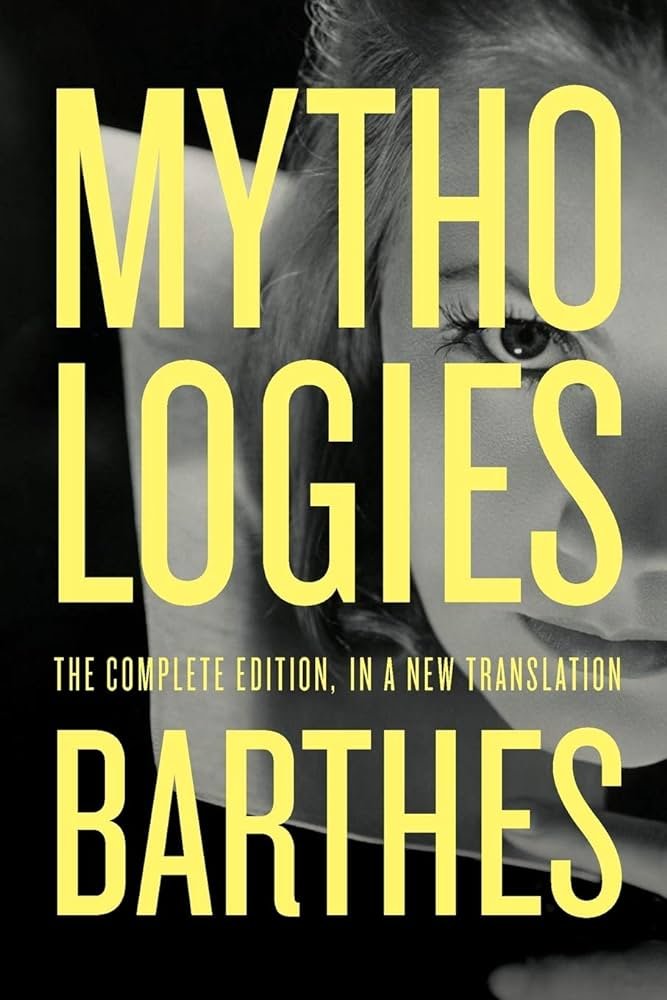Mythologies
Roland Barthes
Back of the Book
"No denunciation without its proper instrument of close analysis," Roland Barthes wrote in his preface to Mythologies. There is no more proper instrument of analysis of our contemporary myths than this book―one of the most significant works in French theory, and one that has transformed the way readers and philosophers view the world around them.
Our age is a triumph of codification. We own devices that bring the world to the command of our fingertips. We have access to boundless information and prodigious quantities of stuff. We decide to like or not, to believe or not, to buy or not. We pick and choose. We think we are free. Yet all around us, in pop culture, politics, mainstream media, and advertising, there are codes and symbols that govern our choices. They are the fabrications of consumer society. They express myths of success, well-being, or happiness. As Barthes sees it, these myths must be carefully deciphered, and debunked.
What Barthes discerned in mass media, the fashion of plastic, and the politics of postcolonial France applies with equal force to today's social networks, the iPhone, and the images of 9/11. This new edition of Mythologies, complete and beautifully rendered by the Pulitzer Prize–winning poet, critic, and translator Richard Howard, is a consecration of Barthes's classic―a lesson in clairvoyance that is more relevant now than ever.
Why You Should Read It
Mythologies offers readers a thought-provoking journey into the realm of semiotics, dissecting the hidden meanings behind cultural symbols and everyday phenomena. Barthes's acute observations and witty analyses reveal the underlying narratives and power structures embedded in seemingly mundane aspects of modern life. What makes the book compelling is its ability to make readers reassess their understanding of common objects, rituals, and societal norms. Barthes challenges us to question the assumptions that underpin our cultural perspectives, encouraging a more critical and nuanced engagement with the world around us. Mythologies is not just a collection of essays; it's an intellectual adventure that prompts readers to unravel the layers of meaning woven into the fabric of our everyday experiences. For those intrigued by the intersection of culture, language, and perception, Barthes's work offers a captivating exploration of the semiotic landscape that shapes our understanding of the world.
Memorable Passage
This book has two determinants: on the one hand, an ideological critique of the language of so-called mass culture; on the other, an initial semiological dismantling of that language: I had just read Saussure and emerged with the conviction that by treating “collective representations” as sign systems one might hope to transcend pious denunciation and instead account in detail for the mystification which transforms petit bourgeois culture into a universal nature.
About the Author
Roland Barthes (1915–1980) was a French literary theorist and philosopher known for his profound impact on semiotics and structuralism. Born in Cherbourg, France, Barthes challenged conventional modes of thought, exploring the intricate relationships between language, signs, and culture. His influential works, such as Mythologies and S/Z, demonstrate a keen intellect and a commitment to unraveling the layers of meaning embedded in everyday life. Barthes's worth lies in his ability to redefine the way we perceive and interpret cultural phenomena, pushing boundaries and inspiring new perspectives. His interdisciplinary approach and insightful analyses of the semiotic structures that shape our understanding of the world make him a figure worth knowing for those interested in the intersections of language, culture, and philosophy.
Recommended By
Lisa Borst


